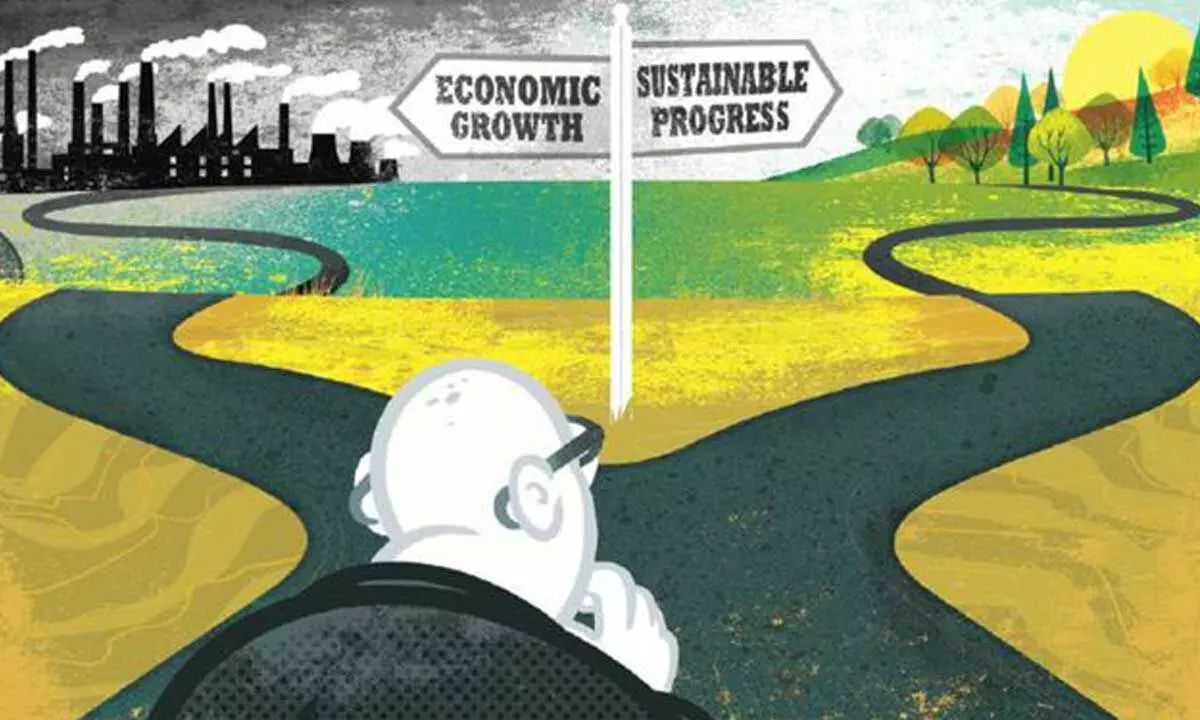Look at alternative economic models

Look at alternative economic models
The concept of degrowth is gaining attention as an alternative to the traditional growth paradigm
The concept of degrowth is gaining attention as an alternative to the traditional growth paradigm. Degrowth theories challenge the assumption that continuous economic growth is desirable and feasible in the long run, suggesting that it may be necessary to intentionally shrink the economy to achieve ecological sustainability and social well-being. Degrowth advocates argue for redefining progress beyond purely economic terms, recognising that well-being and quality of life can be achieved without perpetual economic growth. They emphasise the need to shift focus from material consumption to factors like community, equity, leisure, and ecological resilience.
Degrowth theories emphasize the need to reduce the ecological footprint of human activities to stay within the planet’s ecological limits. This involves prioritising sustainable practices, reducing resource consumption, promoting renewable energy sources, and adopting circular economy principles. Degrowth proponents highlight the need for social justice and redistribution of resources as essential components of a sustainable society.
Degrowth proponents insist on shorter working hours, increased leisure time, and a focus on fulfilling and meaningful activities beyond traditional measures of economic productivity. They call for promoting local economies and self-sufficiency as a means to build resilience and reduce dependence on long-distance trade and resource-intensive global supply chains. This includes supporting local production, sustainable agriculture, and community-based initiatives.
It’s worth noting that degrowth is a diverse and evolving field of thought, encompassing a range of perspectives and ideas. While some proponents argue for a deliberate reduction in GDP, others advocate for a reorientation of societal values and systems, challenging the centrality of economic growth. Implementing degrowth principles would require significant transformations in economic, social, and political structures.
Unlimited growth, particularly in the context of resource consumption and environmental impact, can indeed contribute to ecological disaster, as it involves continuous extraction of natural resources, such as minerals, fossil fuels, and timber. They are consumed faster than they can be replenished. Industrial processes and increased consumption associated with unlimited growth generate vast amounts of pollution and waste, degrading soil, harming ecosystems and, eventually, human health. This process threatens biodiversity, disrupts ecosystems, and accelerates species extinction rates.
Unrestrained growth is closely tied to increased greenhouse gas emissions, primarily from burning fossil fuels for energy production and transportation. These emissions contribute to climate change, resulting in rising temperatures, sea-level rise, extreme weather events, and other adverse impacts on ecosystems and human societies. It can disrupt natural ecological balances by altering nutrient cycles, disrupting food chains, and introducing invasive species. Such imbalances can lead to the decline of certain species, ecosystem collapse, and cascading effects throughout the entire ecosystem.
There is a pressing need to promote responsible resource management, renewable energy sources, biodiversity, implementation of pollution control measures etc., to strike a balance between economic growth and environmental sustainability to avoid the dire consequences of unchecked unlimited growth.
The economic model based on growth is commonly known as the “Growth Paradigm” or “Growth Economy.” It is a framework that emphasizes the pursuit of continuous economic growth as a primary goal for societies. In the growth model, Gross Domestic Product (GDP) is often used as a primary indicator of economic performance and societal progress. The focus is on increasing the overall production and consumption of goods and services, as measured by GDP.
The growth model emphasizes the accumulation of capital, including physical capital (such as factories and infrastructure) and human capital (such as education and skills). Investment in these forms of capital is seen as crucial for promoting productivity, innovation, and economic growth.
The growth model relies on increasing levels of consumption to drive economic activity. It assumes that individuals’ desires for more goods and services are insatiable and that rising consumption levels lead to economic expansion. The growth model typically relies on the extraction and exploitation of natural resources to fuel economic growth. The growth model places a strong emphasis on technological progress as a driver of economic growth. It assumes that advances in technology will lead to increased efficiency, productivity gains, and the creation of new industries and jobs.
Critics of the growth model argue that its relentless pursuit of economic growth can lead to a range of negative consequences, including environmental degradation, social inequalities, and the overconsumption of finite resources. Alternative economic models, such as the steady-state economy or the circular economy, propose different approaches that prioritize sustainability, resource efficiency, and well-being over unlimited growth. These models advocate for a more balanced and holistic approach to economic development that takes into account social and environmental considerations alongside economic goals.
(Writer is the President of Praja Science Vedika and a Professor at TKR Engineering College, Hyderabad)

